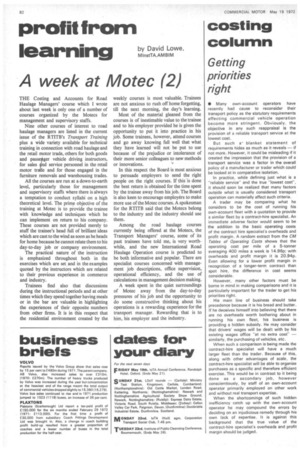costing column
Page 84

If you've noticed an error in this article please click here to report it so we can fix it.
Getting priorities right
• Many own-account operators have recently had cause to reconsider their transport policy as the statutory requirements affecting commercial vehicle operation become more stringent. Obviously, the objective in any such reappraisal is the provision of a reliable transport service at the lowest cost.
But such a blanket statement of requirements hides as much as it reveals — if not more. However, it could be misleading if it created the impression that the provision of a transport service was a factor in the overall policy of a manufacturer Or trader which could be looked at in comparative isolation.
In practice, while defining just what is a "reliable service" and the true "lowest cost", it should soon be realized that many factors outside what is usually considered transport operation can materially affect such criteria.
A trader may be comparing what he considers to be the cost of running his own-account fleet with a quotation to provide a similar fleet by a contract-hire specialist. An Immediate adverse factor would seem to be the addition to the basic operating costs of the contract hire specialist's overheads and profit margin. A random extract from the CM Tables of Operating Costs shows that the operating cost per mile of a 5-tonner averaging 400 miles a week is 14.96p; with overheads and profit margin it is 20.94p. Even allowing for a lower profit margin in recognition of a longer-term contract than spot hire, the difference in cost seems considerable.
However, many other factors must be borne in mind in making comparisons and it is particularly important for the trader to get his priorities right.
His main line of business should take precedence because it is his bread and butter. If he deceives himself into believing that there are no overheads worth bothering about in running his own fleet, his business is providing a hidden subsidy. He may consider that drivers' wages will be dealt with by his existing wages office "at no extra cost" — similarly, the purchasing of vehicles, etc.
When such a comparison is being made the contract-hire specialist will have a much larger fleet than the trader. Because of this, along with other advantages of scale, the contract-hire specialist will be able to organize purchases as a specific and therefore efficient exercise. This would be in contrast to it being done as a secondary job, however conscientiously, by staff of an own-account operator primarily employed on other work and without real transport expertise.
When the shortcomings of such hidden inefficiency catch up with the own-account operator he may compound the errors by deciding on an injudicious remedy through his own lack of expertise. It is against this background that the true value of the contract-hire specialist's overheads and profit margin should be judged.




























































































































